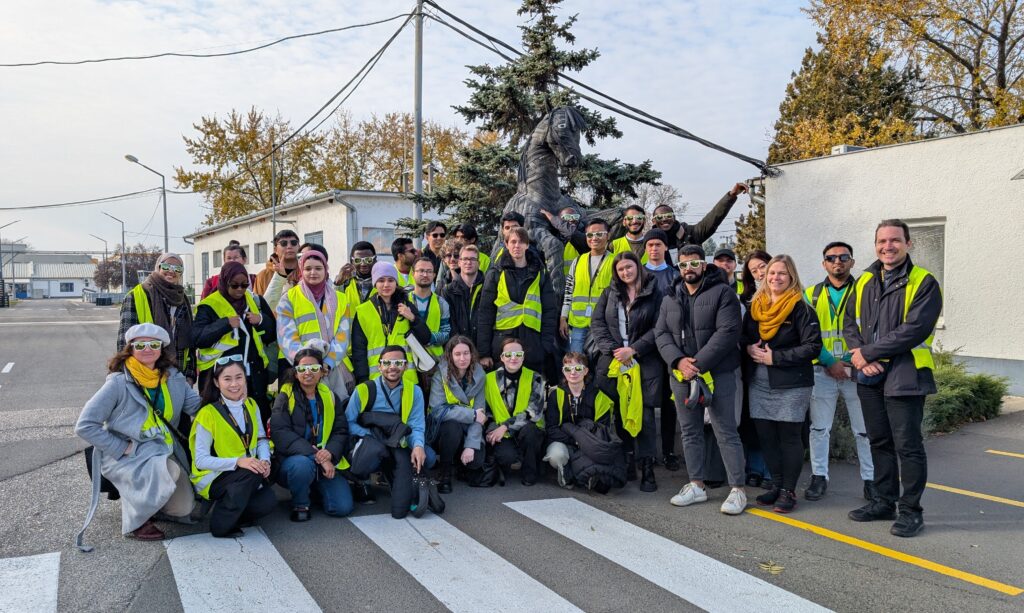A good university always delivers on its promise –– just ask Gabriella Tabajdi. Over 13 years, she chartered her entire academic journey at the University of Szeged (SZTE) — from earning her bachelor’s degree to completing her PhD. Today, she’s come full circle, working as an assistant lecturer at the very institution that shaped her.
“By the time I completed my bachelor studies, I knew my future path,” she says. “I wanted to continue my education, but in doing so, I also wanted to experience an international community and access a wide array of possibilities.”
SZTE made that vision a reality. Beyond its programmes, the university offered a supportive environment that encouraged Tabajdi to explore, ask questions, and grow into the academic she is today.
Success stories like hers explains SZTE’s global standing. It consistently ranks as the best in the country according to the QS World University Rankings. It’s part of the European Higher Education Area, holds EU accreditation and has even earned a Gold rating in Times Higher Education’s new Online Learning Rankings –– solidifying its status as a leader in innovation.
University of Szeged Why the Faculty of Economics and Business Administration
A master’s that crosses borders
The Faculty of Economics and Business Administration stands out for its strong English-taught programmes, including the MSc in International Economy and Business (INEB). This programme is designed for students who want to deepen their understanding of global economic issues while gaining hands-on experience across borders.
A standout feature of the MSc INEB is its Double Degree opportunity. Students can spend their first year in Szeged before completing their second year at either the University of Pavia in Italy or the University of Warsaw in Poland. In just two years, they graduate with two master’s degrees, all without extending their study period. Tabajdi took this route and spent an unforgettable academic year in Italy.
“This unique experience allowed me to earn both a Hungarian and an Italian master’s degree in just two years,” she says. “But the rewards were far greater than diplomas. I gained a whole lifestyle, a new way of thinking, knowledge, passion for my profession and last but not least, a clear sense of my professional path.”
The curriculum itself is built to equip students for international careers. It combines business and economics courses, with a focus on real-world applications. Students learn to analyse macro- and microeconomic challenges, and how to work effectively — both independently and in teams — to support business decision-making at the international level.
The programme is just as customisable as it is foundational. Specific modules allow students to earn diploma supplements in three specialised areas: Finance and Accounting, European Economic Studies, and Global Business Studies. These additions expand students’ knowledge while creating a solid foundation for doctoral-level studies –– an appealing prospect for aspiring academics like Nusrath Jahan Turin.
She sees the MSc INEB as the ultimate stepping stone to research and academic collaboration. “In recent PhD recruitments, universities always encourage applicants’ ability to work in interdisciplinary fields and collaborate across departments,” she says. “This is an excellent opportunity to explore all the relevant areas to set future research interests and understand the subject interactions.”
International Economy and Business Master Program
A PhD programme designed for global impact
The Doctoral School in Economics at the SZTE offers a globally recognised PhD programme. Tailored for those aiming to make their mark in academia or research, it opens doors to leading universities, think tanks, and policy institutions worldwide.
The best part? It’s just as flexible as the MSc INEB, offering a unique Ecological Economics specialisation. This interdisciplinary track combines economic theory with sustainability and social justice issues, preparing students to tackle some of the world’s most pressing challenges.
Another great strength of the programme is its emphasis on professional networking. PhD candidates are encouraged to engage in international conferences, collaborate on cutting-edge research, and attend specialised workshops. These experiences connect them to academics and professionals from across the globe, helping them grow their influence in the international research community.
The programme’s structure ensures students receive consistent support throughout their academic journey. Over the course of four years, they move through a combination of coursework, independent research, and teaching practice. Each student is paired with a dedicated supervisor who provides one-on-one mentorship.
“Throughout my doctoral journey, I received invaluable support from my supervisor, who generously shared his knowledge and expertise,” shares PhD student Sabri Alipanah.
“The doctoral programme in Economics at the SZTE offered an excellent platform for acquiring both quantitative and qualitative research techniques, as well as a variety of statistical methods and software.”
Alipanah’s experience didn’t just sharpen her research skills — it opened doors to exciting career opportunities. Thanks to the professional network she built during her studies, she now works at a research institute within the Euro area and lectures in various economics-related subjects.
Interested in following in her footsteps? Learn more about the University of Szeged today.
Follow the University of Szeged on Facebook, Instagram, LinkedIn, X, TikTok, and YouTube

